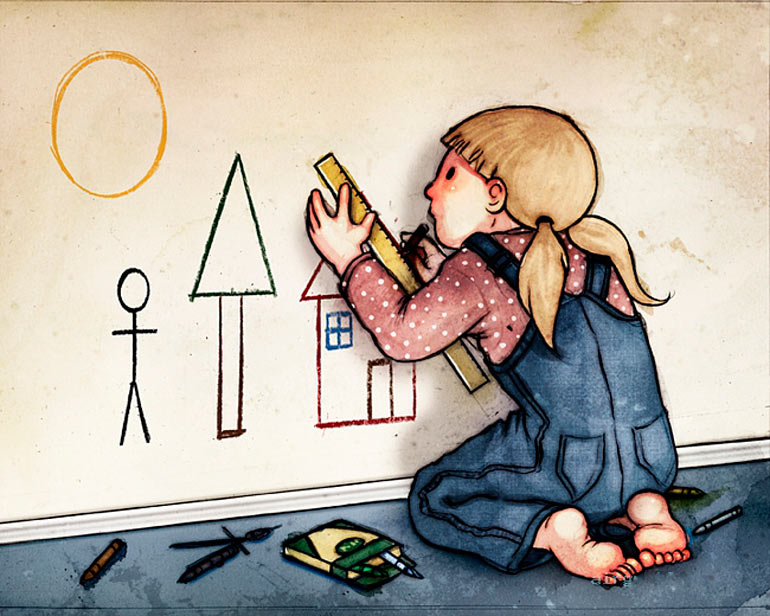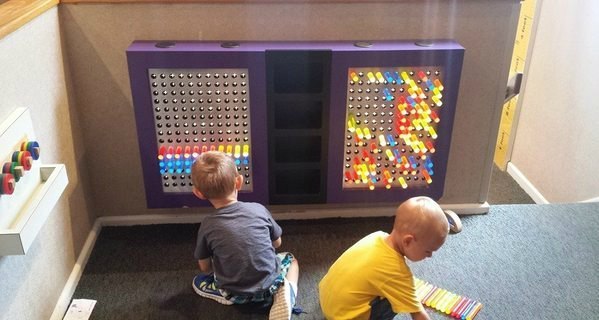Sometimes the child’s self-esteem depends too much on perfectionism - an obsessive desire to achieve excellence, which means good grades or praise from significant people. Dependence on the expectations and opinions (real or perceived) of the people around them makes such children their own worst critics. What is children's perfectionism and how to cure a child of impeccability?

What is perfectionism?
Imagine a child with a clean room, the best homework in the classroom. He is always the first to complete the task and strives to make it better than anyone. Agree, not the worst character traits. Olympic champions, famous musicians and writers have reached unprecedented heights in their fields of activity thanks to hard work and a desire to be the first.
However, for some children, this desire can become an obsessive struggle for perfection. In psychology, perfectionism is understood as the desire of a person to achieve the best result. The perfectionist child sets himself too high standards and becomes excessively self-critical if these ideals are not achieved. Such maximalism can lead to fear of the new, anxiety, depression, low self-esteem and an exaggerated reaction to mistakes. All this prevents the child from developing normally and enjoying communication and playing sports.
Features of a baby perfectionist

The danger of such self-improvement is that the child may lose the joy of discoveries and inventions or the desire to learn. After all, he is constantly haunted by fear of not achieving the ideal.
Perfectionists:
- Avoid trying something new for fear of failure;
- focus on mistakes, not on a job well done;
- set unrealistic goals, and then condemn themselves when they do not achieve them;
- accept criticism with hostility, cannot laugh at themselves;
- pay attention to the final goal, and not to the learning process;
- become discouraged if someone evaluates their work is not "excellent";
- do not finish the work if they consider it imperfect.
Reasons for children's impeccability
The origins of perfectionism, as well as many other children's problems, are often worth looking for in the family. Each parent has high hopes for his offspring, as he wants to see him successful. At an early age, the child understands that maternal love still needs to be earned. Than? Good behavior.
With admission to school, only good grades are considered successes, preferably five. Any failure is disapproving: why is “good” and not “excellent”? The child understands that only becoming a medalist, an excellent student or a champion, he will earn parental approval.
In addition, the character and temperament of the child also play an important role. Children who are very sensitive and anxious are more likely to become perfectionists.
How to help a child
If the pursuit of excellence becomes a habit and harms the development of the child, you need to help him. From children's perfectionism there are effective "medicines", only they need to be given to children constantly, and not from case to case. At the first stage, you will have a hard time, since you will need to break your previous educational tactics.
- Draw the child’s attention to the importance of learning new information, not to evaluate. If he got “excellent”, say: “You did a very good job and learned a lot of new things”, and not “Great, one more five”.
- Have a child talk about their failures. Explain that each error can be corrected, as well as learn something new from it. Every failure gives a chance to do a better job next time. But do not overdo it, otherwise you can raise a hack worker.
- Give your child tasks that will help him realize his talents, hone his skills and increase his self-confidence. Do not spare words of approval and confirmation of the strengths of the child, his achievements and skills.
- Constructive criticism and decision options can help your child see what went wrong and how to do this next time.
- Avoid comparing your child with his peers. This makes the child nervous and aggravates the situation.
- Reduce your workload for a while. Too many sections and circles overload the nervous system.
- Rid the child of unattainable ideals. Tell that each person has strengths and weaknesses.
- Encourage communication with peers. So he will become more tolerant towards others, will make new friends and will understand that it is not necessary to always be the best.
- Read wonderful therapeutic stories from Doris Brett’s book “Once upon a time there was a girl like you ...” The tales tell about a girl who did everything perfectly and wanted to become even better.
If your child is convinced that an imperfect result of work is unacceptable, makes himself and other people exaggerated demands, then you have a hard way to deal with perfectionism. It is necessary to firmly understand and explain to children that the acquisition of new knowledge, the development of imagination, the ability to take risks and enjoy discoveries are much more important than high marks.
[sc: ads]









So far, we have no signs that are listed here and I hope that they never appear. I want my child to be normal and not afraid to try something new.
Unfortunately, we have such a problem and it’s my own fault .. Now I will work to wean the child from the desire to be the best in everything, otherwise it will be difficult for him to live.
So far, we are one year old and in no case will I force the child to be perfect. Then, in the future, it will be difficult for him and the risk of a nervous breakdown is too high.
Thanks for the article, very caught in time!